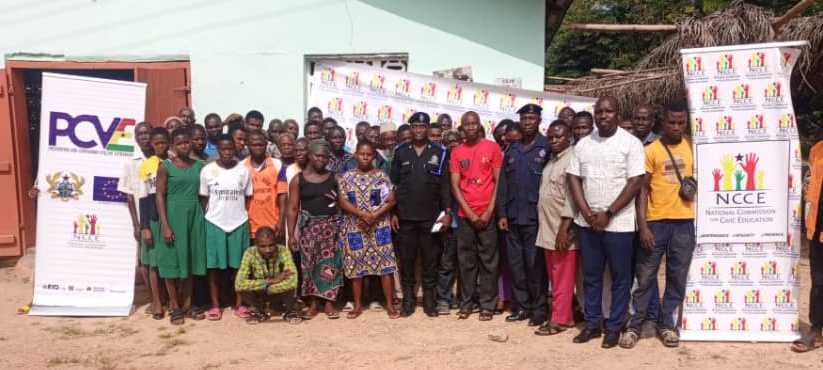Youth Activist Forum for Political Parties Concludes in Kadjebi

The National Commission for Civic Education (NCCE) has extended its two-year campaign aimed at raising awareness about the prevention and containment of violent extremism (PCVE) to the Oti Region. This initiative is part of a broader effort to combat the growing threat of violent extremism in the West African sub-region. The campaign, which originally targeted the northern regions of Ghana, has now been expanded to include neighboring areas such as Oti, following concerns about the spillover of violence from neighboring countries.
The campaign was initially launched in November 2022 in the five northern regions of Ghana—Northern, North-East, Upper West, Upper East, and Savannah regions. The NCCE has now extended its reach to Oti, Bono, and Bono East, regions that border the northern areas and share similar vulnerability to violent extremism. The campaign, funded by the European Union (EU), was originally planned to run for 18 months and conclude in May 2024. However, due to the increasing risks and the need for continuous education, the campaign’s timeline was extended until November 2024.
At a political party youth activist forum held in Kadjebi on Thursday, Daniel Agbesi Latsu, the District Director of the NCCE, explained the significance of the campaign and the importance of educating the public, particularly the youth, about the dangers of violent extremism. He emphasized that given the rising violence in countries bordering Ghana, it is crucial to raise awareness and equip the population with the knowledge needed to prevent the spread of extremist ideologies.
Mr. Latsu noted that Ghana had been fortunate to remain largely unaffected by violent extremism so far, but this situation could change if preventative measures were not put in place. He explained that the campaign had already reached the northern regions, which are more vulnerable to extremist activities due to their proximity to conflict zones in neighboring countries. Now, with Oti, Bono, and Bono East added to the list, the NCCE aims to ensure that communities in these regions are well-prepared to resist any attempts at radicalization or violence.
The forum in Kadjebi, attended by 40 youth activists from various political parties, was designed to enhance participants’ understanding of peaceful coexistence, tolerance, and the importance of non-violence. The youth representatives came from the New Patriotic Party (NPP), the National Democratic Congress (NDC), the National Democratic Party (NDP), the Liberal Party of Ghana (LPG), as well as the Persons with Disabilities (PWD) community and local students. The forum focused on how political activism can be channeled in a peaceful and constructive manner, and it encouraged participants to spread the message of tolerance and unity within their communities.
Setriakor Gagakuma, the Deputy Regional Director of NCCE for Oti, spoke about the underlying factors that contribute to violent extremism, particularly among the youth. He highlighted that feelings of marginalization and poverty are key factors that make young people more susceptible to extremist ideologies. When individuals feel excluded from society or unable to meet their basic needs, they may turn to groups that offer a sense of belonging or promise solutions to their problems. Mr. Gagakuma explained that violent extremist groups often exploit these vulnerabilities to recruit individuals and draw them into their fold.
He also urged the public to be vigilant and alert to the signs of potential radicalization, particularly in communities where young people may feel disenfranchised or disconnected. He encouraged participants to be aware of suspicious behavior or individuals who might be attempting to recruit others into violent ideologies. Mr. Gagakuma advised community members to report such individuals to security agencies or traditional authorities, so the necessary interventions could be made before the situation escalated.
Furthermore, he emphasized that places where large groups of people gather, such as churches, mosques, and markets, are often targeted by extremists seeking to cause harm. As such, he called for heightened security and vigilance in these public spaces.
In addition to the discussions on violent extremism, Eric Arthur Fynn, the Kadjebi District Director of the Commission for Human Rights and Administrative Justice (CHRAJ), gave a timely reminder about the upcoming 2024 elections. Mr. Fynn cautioned the youth against being manipulated by politicians who might try to bribe them with money or encourage violent behavior. He advised them to resist accepting cash gifts from politicians, as they could be used to buy votes or sow division within communities. By rejecting such offers, Mr. Fynn explained, the youth would send a strong message that politicians should focus on using their resources to improve their communities, rather than attempting to manipulate voters with short-term handouts.
Mr. Fynn also warned the youth to be wary of politicians who might try to incite them into violent confrontations or encourage civil unrest. He urged the youth to remain calm, peaceful, and focused on the long-term goal of building a stronger, more united Ghana.
The forum served as an important platform for engaging the youth in discussions about the risks of violent extremism and the role they can play in promoting peace and security in their communities. By educating the next generation of leaders, the NCCE aims to strengthen Ghana’s resilience to the spread of extremism and ensure that the country remains a beacon of peace and stability in West Africa.






